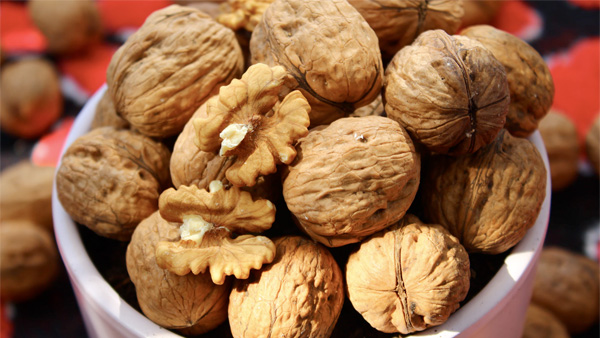Nutrition
oi-Shivangi Karn
on July 20, 2021
Nuts are nutrient dense foods with abundance of bioactive compounds. Walnut, in particular, is among the top list of nuts known for its innumerable health outcomes. It belongs to the family Juglandaceae.
Though walnut is commonly consumed as a nut, botanically it is not. Walnut is basically a drupe or say those fruits whose seeds we eat which are present inside the shell or pit. Some of the other examples of drupes are almonds and pecans.
Walnut is primarily a cognitive and memory boosting nut, however, its health benefits are not just restricted to brain health. The antioxidants in walnuts are good for heart, teeth, mental health, metabolism and reproductive health too. [1]
In this article, we will discuss the health benefits of walnuts. Take a look and don’t forget to include this healthy nut in your daily diet.
Nutritional Profile Of Walnut
100 g of walnut contains 4.07 g of water and 654 kcal of energy. Apart from that, it also contains: [2]
Antioxidants In Walnut
According to a study, walnut is packed with antioxidants (3.68 mmol/oz). It includes antioxidants (including antioxidants vitamins and minerals) like flavonoids, ellagic acid, folate, gamma tocopherol, alpha tocopherol (vitamin E), delta tocopherol, vitamin E, selenium, melatonin and proanthocyanidins.
Walnut also contains an abundance of a plant-based omega-3 fatty acid alpha-linolenic acid, along with dietary fibre, proteins, magnesium and phosphorus.
The study also adds that out of 1113 different foods tested for their antioxidants, walnuts ranked second, followed by almonds and cashews. Some studies also say that phenolic compounds in walnut is greater than apple juice and red wine. [3]
Health Benefits Of Walnut

Health Benefits Of Walnuts
1. Boosts cognition and brain health
Amyloid beta-protein promotes amyloid plaques in the brain which leads to the development of Alzheimer’s, dementia and other degenerative diseases and cognitive impairment disorders. Walnut has neuroprotective compounds such as melatonin, vitamin E, omega-3 fats and folate antioxidant and anti-inflammatory effects.
Consuming walnuts may help improve cognition and promote memory, learning and motor coordination, thus improving cognitive performance and boosting brain health. [4]
2. Prevents heart disease
Walnut has cardioprotective mechanisms due to its effect on cholesterol levels, heart rate and endothelial function, says a study. The presence of L-arginine, an amino acid in walnut provides multi-vascular benefits for people who are ailing from heart problems or at great risk of having a cardiac arrest. Walnut is also rich in plant-based omega-3 fatty acid alpha-linolenic acid (ALA) which has potent anti-inflammatory and anti-coagulant activities.
It may help prevent the formation of blood clots and lower the risk of a heart attack. Some studies say that consuming four walnuts a day can reduce 50 per cent chances of developing a cardiac arrest. [5]
Guava Fruit And Leaves For People With Diabetes: Are They Healthy?
3. Manages diabetes
According to a study, the prevalence of diabetes is significantly low among walnut consumers compared to those who are not. Walnuts, especially soaked walnuts have a positive impact on both pre-diabetics and diabetics. It can help control the glucose levels by reducing the cholesterol levels, controlling the body mass and increasing satiation. Other compounds that also help in managing diabetes include omega-3 fats, molybdenum, copper, biotin and manganese.
Some studies also say that obese adults who have diabetes have shown a significant reduction in fasting sugar levels after consuming a cup of walnuts daily in their diet. [6]
4. Has chemopreventive property or helps fights cancer
A study has shown that certain active compounds in walnuts such as omega-3 fatty acids, beta-sitosterol, tocopherols and pedunculagin have cancer-preventive properties.
These compounds can inhibit the growth of cancerous cells and contribute to cancer suppression. Walnuts may slow the growth of certain cancer types like breast, colon, prostate and renal due to their antiangiogenic and antiproliferative mechanisms. [7]
Doctors Remove 82 Teeth From Teenager Due To Rare Tumour Complex Odontoma

5. Fight depression and other mental health issues
Walnut is a part of Mediterranean diet which is known for lowering risk of depression and other mental health disorders. According to a study, the depression rate is 26 per cent lower in individuals who consume walnuts compared to non-nut consumers. [8]
READ RELATED: Coronavirus: Why won't my Covid-19 symptoms go away?
Other studies show that the presence of neuroprotective compounds such as folate, vitamin E, fatty acids and melatonin in walnut may help boost the mood by improving the concentrations of two happy hormones; serotonin and dopamine. [9]
6. Improves body metabolism
Certain foods help increase the body’s metabolism or breaking of large organic molecules into smaller ones to produce energy. Metabolism helps our body to digest, think, breathe, maintain body temperature and carry out many vital body functions.
Walnut is among the top foods that may help improve the body metabolism and bring positive changes to metabolic syndrome status such as reducing weight and lower cholesterol levels. [10]
7. May help lose weight
There are many ways in which walnut may help lose weight. According to a study, walnut consumption, with a less-energy diet, can help promote weight loss compared to walnut intake with a high energy diet.
Walnuts help lower cholesterol levels, body fat and promote satiety, thus contributing to weight management. Walnuts can also help decrease waist circumference and waist-to-hip ratio, if consumed in a recommended amount. [11]
8. Promotes better sleep
Walnuts may play a key role in treating insomnia and promoting good sleep. The vital nutrients such as potassium, melatonin, calcium, L-ornithine and hexadecanoic acid in walnuts may help promote neurochemicals such as serotonin, dopamine and acetylcholine which can contribute to improving sleep.
These compounds also help calm the nervous system and improve sleep quality. [12]

9. Makes bone and teeth strong
A study has shown that walnuts may play an important role in preventing postmenopausal osteoporosis, especially due to the presence of ellagic acid along with other antioxidant compounds.
A walnut-enriched diet has a beneficial effect on bone health and may prevent them from demineralisation. Walnuts may also help prevent teeth from decay due to the presence of vital minerals like calcium. [13]
10. Improves male fertility
A study demonstrates that adding walnuts to a regular diet can help improve sperm motility, vitality and morphology and thus, improve the reproductive health of men.
This is due to the presence of vital antioxidants in walnut that may help reduce the effect of free radicals in the body and their damage to sperm and reproductive organs like the testis. Walnuts could be a great food choice for men to enhance their fertility. [14]
11. Support digestive system
A study has shown that a walnut-enriched diet may help improve the gut microbiome and support the digestive system in a healthy way.
Daily consumption of 43 g of walnuts for eight weeks can enhance probiotic and butyric acid-producing microbes in the gut of healthy individuals and significantly improve their gastrointestinal health, which is primarily related to the immune system of individuals. [15]
12. Promotes skin and hair health
Vitamin A, B, E and other antioxidants in walnuts may help reduce early signs of ageing and promote good skin health by reducing dark circles, keeping the skin moisturised and giving glowing and bright skin.
Walnut’s omega-3 and vitamin E also helps keep hair healthy by strengthening hair follicles, treating dandruff and preventing balding of hair.

How To Consume Walnut?
- For good skin health, you can massage walnut oil before going to bed and wash with lukewarm water, or can prepare a paste out of it along with oats and honey and apply it on your face, followed by washing with cold water.
- For strengthening hair, you can apply walnut oil or walnut-based shampoo or conditioner.
- To lose weight, consume 5-6 walnuts before any two meals, followed by drinking a glass of water after 15-30 minutes to make you full.
- For diabetes and lowering cholesterol, soak 2-4 walnuts overnight in a cup of water and consume in an empty stomach the next morning.
Note: In many cases, walnuts are consumed after soaking them overnight as it helps get rid of harmful tannins in the skin of raw walnuts, along with making it digestive, chewable and less astringent.
To Conclude
It is better to consult a medical expert or a dietician to understand when and how much walnuts to consume, depending on your medical condition and which health benefits you specifically desire.
GET THE BEST BOLDSKY STORIES!
Allow Notifications
You have already subscribed
Story first published: Tuesday, July 20, 2021, 16:30 [IST]
Source:










